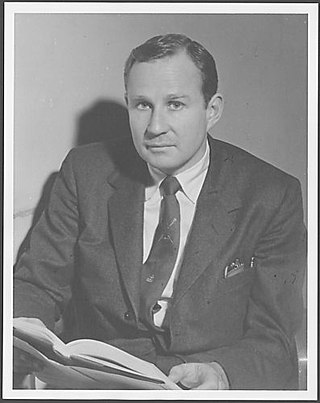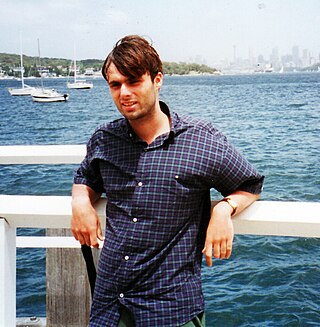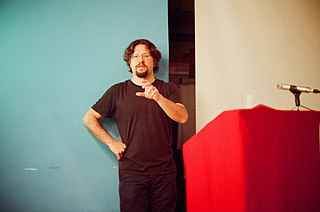Nihilism is a philosophical approach that rejects the absolute validity of commonly accepted or fundamental aspects of human existence, such as knowledge, morality, or meaning, while not directing towards any specific conclusion, such as the rejection of values.

Wilfrid Stalker Sellars was an American philosopher and prominent developer of critical realism, who "revolutionized both the content and the method of philosophy in the United States".

Alain Badiou is a French philosopher, formerly chair of Philosophy at the École normale supérieure (ENS) and founder of the faculty of Philosophy of the Université de Paris VIII with Gilles Deleuze, Michel Foucault and Jean-François Lyotard. Badiou's work is heavily informed by philosophical applications of mathematics, in particular set theory and category theory. Badiou's "Being and Event" project considers the concepts of being, truth, event and the subject defined by a rejection of linguistic relativism seen as typical of postwar French thought. Unlike his peers, Badiou openly believes in the idea of universalism and truth. His work is notable for his widespread applications of various conceptions of indifference. Badiou has been involved in a number of political organisations, and regularly comments on political events. Badiou argues for a return of communism as a political force.
Non-philosophy is a concept popularized by French philosopher François Laruelle.

Alexander R. Galloway is an author and professor in the Department of Media, Culture, and Communication at New York University. He has a bachelor's degree in Modern Culture and Media from Brown University and earned a Ph.D. in literature from Duke University in 2001. Galloway is known for his writings on philosophy, media theory, contemporary art, film, and video games.
In philosophy, facticity has multiple meanings — from "factuality" and "contingency" to the intractable conditions of human existence.

François Laruelle is a French philosopher, formerly of the Collège international de philosophie and the University of Paris X: Nanterre. Laruelle has been publishing since the early 1970s and now has around twenty book-length titles to his name. Alumnus of the École normale supérieure, Laruelle is notable for developing a science of philosophy that he calls non-philosophy. He currently directs an international organisation dedicated to furthering the cause of non-philosophy, the Organisation Non-Philosophique Internationale.
Quentin Meillassoux is a French philosopher. He teaches at the Université Paris 1 Panthéon-Sorbonne.
Speculative realism is a movement in contemporary Continental-inspired philosophy that defines itself loosely in its stance of metaphysical realism against its interpretation of the dominant forms of post-Kantian philosophy.
Iain Hamilton Grant is a British philosopher. He is a senior lecturer at the University of the West of England in Bristol, United Kingdom. His research interests include ontology, European philosophy, German Idealism, and both contemporary and historical philosophy of nature. He is often associated with the recent philosophical current known as Speculative Realism.

Jason Barker is a British theorist of contemporary French philosophy, a novelist, film director, screenwriter, and producer. He is Honorable Professor at Kyung Hee University in the College of Foreign Language and Literature, where he teaches a masters course on Marxism and Literature with the British philosopher Ray Brassier. He was previously a visiting professor at the European Graduate School, having taught in the Faculty of Media and Communication alongside Alain Badiou, Judith Butler, Jacques Rancière, Avital Ronell, Slavoj Žižek, and others.
Nick Land is an English philosopher, who has been described as "the Godfather of accelerationism". His work has been tied to the development of speculative realism. He was a leader of the 1990s "theory-fiction" collective Cybernetic Culture Research Unit after its original founder cyberfeminist theorist Sadie Plant departed from it. His work departs from the formal conventions of academic writing and embraces a wide range of influences, as well as exploring unorthodox and "dark" philosophical interests.

Alberto Toscano is an Italian cultural critic, social theorist, philosopher, and translator. He has translated the work of Alain Badiou, including Badiou's The Century and Logics of Worlds. He served as both editor and translator of Badiou's Theoretical Writings and On Beckett.
Oliver Feltham is an Australian philosopher and translator working in Paris, France. He is known primarily for his English translations of Alain Badiou, most notably Badiou’s magnum opus Being and Event (2006). Feltham's own writings are drawn from many of his research interests including Marxism, critical theory, and the history of metaphysics. His recent work has also focused on psychoanalysis and Jacques Lacan.
Justin Clemens is an Australian academic known for his work on Alain Badiou, psychoanalysis, European philosophy, and contemporary Australian art and literature. He is also a published poet.

Graham Harman is an American philosopher. He is Distinguished Professor of Philosophy at the Southern California Institute of Architecture in Los Angeles. His work on the metaphysics of objects led to the development of object-oriented ontology. He is a central figure in the speculative realism trend in contemporary philosophy.
In metaphysics, object-oriented ontology (OOO) is a 21st-century Heidegger-influenced school of thought that rejects the privileging of human existence over the existence of nonhuman objects. This is in contrast to post-Kantian philosophy's tendency to refuse "speak[ing] of the world without humans or humans without the world". Object-oriented ontology maintains that objects exist independently of human perception and are not ontologically exhausted by their relations with humans or other objects. For object-oriented ontologists, all relations, including those between nonhumans, distort their related objects in the same basic manner as human consciousness and exist on an equal ontological footing with one another.
Eugene Thacker is an American author. He is a professor of media studies at The New School in New York City. His writing is associated with the philosophy of nihilism and pessimism. Thacker's books include In the Dust of This Planet and Infinite Resignation.

Syntheism is a new religious movement that is focused on how atheists and pantheists can achieve the same feelings of community and awe experienced in traditional theistic religions. The Syntheist Movement sees itself as the practical realisation of a philosophical ambition for a new religion dating back as far as Baruch Spinoza's pantheism in the 17th century and, most directly, British-American philosopher Alfred North Whitehead's pioneering work towards a process theology in his books Religion in the Making in 1926 and Process and Reality in 1929.








